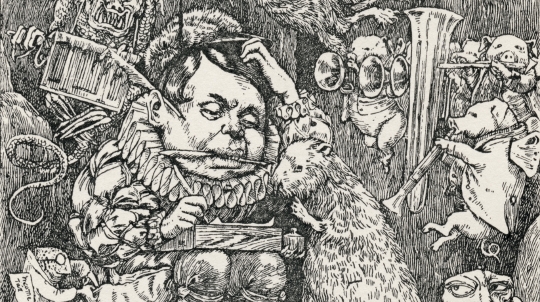They're not the sort of feet people or ostriches have, though, but the sort that keeps English poetry from falling over.
Actually, now I come to think about it, though, triffids might have anapaests. If triffids existed. Which I hope they don't.
Anyway.
English words often have bits in them that are said loudly, and other bits that are said more softly So: ENGlish, for example (and, for another example, exAMPle). This is jolly important in English poetry, which tends to be arranged so the loud bits come along in a regular pattern: for instance, MAry HAD a LITTle LAMB, where the loud bits and soft bits take it in turns.
Mary had a little lamb goes loud/soft, loud/soft etc, and each loud/soft is called a foot.
All feet in all verses have just one loud bit in it, but the soft bits can come in various positions and numbers.
An anapaest is a foot which goes soft soft LOUD. For instance, the lyrics of the song You'll Never Walk Alone begin with some anapaests: If you WALK, through the STORM, hold your HEAD...
The example that's usually given of verse containing anapaests is this one:
- The ASSYRian came DOWN like a WOLF on the FOLD
- And his COhorts were GLEAMing in PURple and GOLD
- And the SHEEN of their SPEARS was like STARS on the SEA
- When the BLUE wave rolls NIGHTly on DEEP GaliLEE.
Anapaests do gallop along very nicely. Here's one last example from Lewis Carroll and The Hunting of the Snark:
In the midst of the word he was trying to say
In the midst of his laughter and glee
He had softly and suddenly vanished away
For the Snark was a Boojum, you see.

Illustration by Henry Holiday. It's from The Hunting of the Snark, but it doesn't show the Snark itself: Lewis Carroll rejected Holiday's illustration of the Snark because Carroll wanted the Snark to remain pleasingly mysterious.
Thing To Hear Today: an anapaest. If stuck, all you need to do is say: will you come? or in a hole?
The word anapaest comes from the Greek word anápaistos, struck back (because the pattern LOUD soft soft, which is a back-to-front anapaest, seemed more normal to the Greeks) from ana, which means back, and paiein, to strike.
No comments:
Post a Comment
All comments are very welcome, but please make them suitable for The Word Den's family audience.